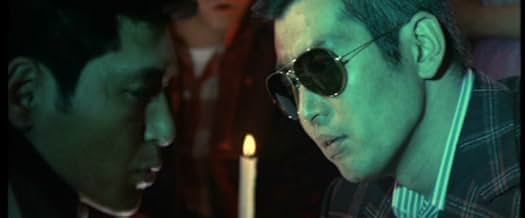IMDb-BEWERTUNG
7,1/10
2028
IHRE BEWERTUNG
Füge eine Handlung in deiner Sprache hinzuA self-destructive man becomes a powerful member of the Japanese mafia but quickly loses his self control. Based on the true story of Rikio Ishikawa.A self-destructive man becomes a powerful member of the Japanese mafia but quickly loses his self control. Based on the true story of Rikio Ishikawa.A self-destructive man becomes a powerful member of the Japanese mafia but quickly loses his self control. Based on the true story of Rikio Ishikawa.
- Auszeichnungen
- 1 wins total
Handlung
WUSSTEST DU SCHON:
- VerbindungenFeatured in IFC Grindhouse: Graveyard of Honor (2007)
Ausgewählte Rezension
Kinji Fukasaku's mid-70s faux-biopic of a sociopath Yakuza gangster in late-40s Japan is certainly an absorbing experience, even if it never quite manages to immerse the viewer entirely in the nihilism of the world in which Tetsuya Watari's Rikio Ishikawa exists. It's difficult really to determine whether Fukasaku is trying to attract or repulse us here and, for me, this is the film's main weakness. Ishikawa has no redeeming features: he's simply a crude, boorish rapist and murderer who invokes unexplainable loyalty in those around him. There is some amusement to be found in the bewilderment of Ishikawa's Yakuza superiors, who don't seem to know quite what to do with the loose cannon in their midst (presumably something in the Yakuza code prevents them from simply taking him into a back alley and shooting him like a dog) but, for all its kinetic energy and undeniable style Graveyard of Honour mostly fails to fascinate, and fascinate it must the way a caterpillar squirming on the end of a pin fascinates if it is to hold an audience who can feel little or no connection with its main character.
Despite these criticisms, the film is never dull. Fukasaku is an unsurpassable director, completely confident of his skills, totally focused, and unafraid to adopt subjects and styles that must have seemed out of the ordinary at the time. It's to his credit that most of the techniques he uses in this film are still widely used today especially by US gangster flicks. Fukasaku fills the screen with people in this one, countless people, hundreds of them, conveying the raucous and claustrophobic overcrowding of a country recovering from a bruising war. And while attention to period detail is perhaps not this film's strong point, this shortcoming is overcome by good use of sepia tones to reinforce the sense of history.
Despite these criticisms, the film is never dull. Fukasaku is an unsurpassable director, completely confident of his skills, totally focused, and unafraid to adopt subjects and styles that must have seemed out of the ordinary at the time. It's to his credit that most of the techniques he uses in this film are still widely used today especially by US gangster flicks. Fukasaku fills the screen with people in this one, countless people, hundreds of them, conveying the raucous and claustrophobic overcrowding of a country recovering from a bruising war. And while attention to period detail is perhaps not this film's strong point, this shortcoming is overcome by good use of sepia tones to reinforce the sense of history.
- JoeytheBrit
- 23. Apr. 2007
- Permalink
Top-Auswahl
Melde dich zum Bewerten an und greife auf die Watchlist für personalisierte Empfehlungen zu.
- How long is Graveyard of Honor?Powered by Alexa
Details
- Erscheinungsdatum
- Herkunftsland
- Offizieller Standort
- Sprachen
- Auch bekannt als
- Graveyard of Honor
- Drehorte
- Produktionsfirma
- Weitere beteiligte Unternehmen bei IMDbPro anzeigen
Zu dieser Seite beitragen
Bearbeitung vorschlagen oder fehlenden Inhalt hinzufügen

Oberste Lücke
By what name was Jingi no hakaba (1975) officially released in India in English?
Antwort


























